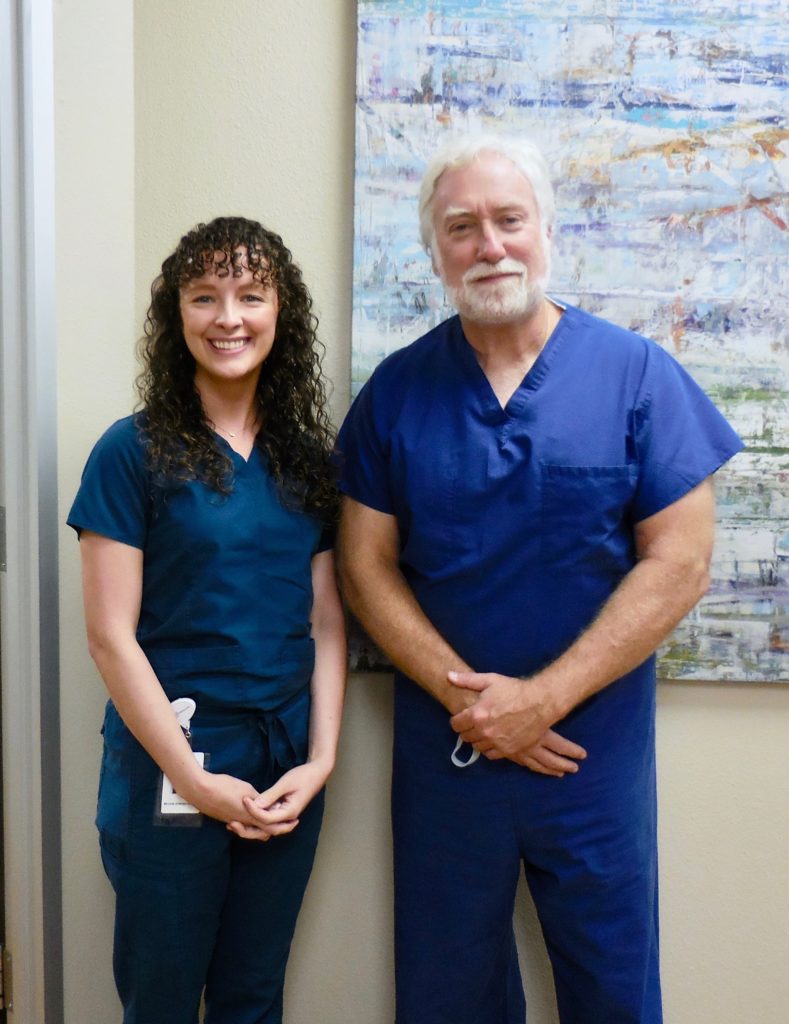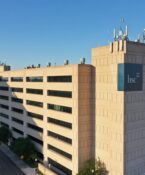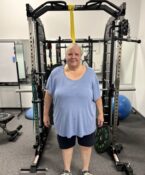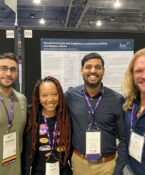Following her heart, TCOM student takes a chance and matches late into specialty of her dreams
It was another late night in July for Megan Jenkins-Turner, DO, waiting for her husband to get home from work, and surfing the internet hoping to find an open General Surgery residency position. Dr. Jenkins-Turner had graduated from the Texas College of Osteopathic Medicine months earlier, but was without a job and a residency, all because of a calculated risk she took following her dream.
The stakes are high, the rewards even higher for medical students going through the residency interview process and preparing to pick a specialty. It all leads up to the climactic moment of Match Day. Dr. Jenkins-Turner knew the risks, but decided to follow her dreams, even if that meant changing her desired specialty and possibly not matching.
This is the story of how a TCOM preceptor became a mentor and helped change the path of a medical student, who beat the odds and went from chasing her dream to living it.
Making the switch
Throughout most of her medical school career, Dr. Jenkins-Turner zeroed in on Internal Medicine as a specialty. In April of 2020, near the end of her third year, it came time for her surgery rotation with Dr. Steven Curley, a TCOM preceptor at Christus Mother Francis Hospital in Tyler, Texas. Dr. Curley is a world-renowned fellowship trained surgical oncologist, who practiced at MD Anderson and has over 30 years of experience.
It was during her time with Dr. Curley that Dr. Jenkins-Turner had her first spark of interest in surgery. Although stoic throughout most of the rotation, Dr. Curley was testing her to see how she could perform and her ability to think on her feet. Near the end of her rotation, Dr. Curley gave his pupil a reason to consider surgery.
“He told me that in his 30-plus-year career I’m one of the top five percent of students he’s worked with,” said Dr. Jenkins-Turner. “I was shocked, I couldn’t believe it. It really led me to say this is something I should pursue. I had been preparing my residency application for Internal Medicine but thought this would be a huge change. I didn’t think I was competitive for surgery and there are a lot of risks.”
Dr. Curley said, “Dr. Jenkins-Turner is energetic, engaged, thorough, thoughtful, and has excellent communication skills. She showed incredibly strong aptitude and hand-eye coordination skills needed to become an excellent surgeon. I advised her to follow her heart and to do what she was passionate about, which fortunately for us is surgery.”
As Dr. Jenkins-Turner began her fourth year in summer 2020, the application process and residency preparations for medical students was in high gear. In late September, residency program directors look at applications and schedule interviews with perspective students. She kept going down the Internal Medicine path, receiving nine interviews.
She applied for the two closest surgery programs on a whim, after her rotation with Dr. Curley peaked her interest in the field, and completed one interview. By time the calendar year was ending, Dr. Jenkins-Turner knew what she wanted.
“In December, I decided Internal Medicine isn’t for me,” said Dr. Jenkins-Turner. “The more I thought about it, the more I realized surgery is my calling and there is no way I could pursue internal medicine. I cancelled the rest of my interviews because I knew that I would not be fulfilled, which ultimately would be a disservice to my patients. I also didn’t want to take away an internal medicine spot from someone else.”
Changing specialties late in the process is fraught with risks. But TCOM has an advisory team that helps medical students navigate the residency process practically starting when they arrive on campus.
“Occasionally students will change their specialty choice after applying for residency in September, however it does not happen often,” said Melva Landrum, TCOM’s Director for Medical Student Success who also serves as a residency counselor.
Landrum is an expert on Match Day. Her team gives students detailed breakdowns on how many interviews they need to schedule for their chosen specialty. For surgery, the average target is 12 interviews, so students have a higher chance to match. Dr. Jenkins-Turner only interviewed at one program.
“Although I was concerned when she decided to pursue surgery only, I felt privileged that she was comfortable enough to confide in me about her switch in strategy,” Landrum said. “We discussed and prepared for the best-case scenario; her matching into general surgery. However, we also had to discuss the high possibility of her going through the post-match (SOAP) process.”
Rock bottom
In advance of Match Day, Dr. Jenkins-Turner ranked the one surgery program she interviewed for and hoped for the best. When the day arrived, Dr. Jenkins-Turner invited family and friends over to wait for the email announcing whether she matched to hit her inbox. When it did, the festive atmosphere vanished.
She did not match.
“I honestly froze and handed my husband the email and asked him what we needed to do,” Dr. Jenkins-Turner said. “I needed a few minutes to process it. I was not completely devastated, but it was still a kick. I had high hopes, I thought it might work out, but of course I knew it was a huge risk.”
Dr. Curley said, “She took a risk applying to only one program, and that program will regret not matching her. She is clearly one of the best trainees I have encountered in over 30 years as an academic surgeon.”
It was a gut punch that all medical students dread but must prepare for. But Dr. Jenkins-Turner had little time to process the news — she needed to find a residency program fast. The SOAP process as it is called, or supplemental offer and acceptance program, is intended for students who do not match. It helps them scour the nation for open residency programs and schedule as many interviews as possible in a 48-hour period.
Dr. Jenkins-Turner applied to 45 surgery programs — the maximum allowed — but heard nothing back. As the weeks passed, approximately 15 surgery residency positions opened in surgery, but nobody called her.
She was a soon-to-be medical school graduate, and unemployed. Was her dream over? The doubt crept into her mind… but only briefly.
A dream come true
On May 14, Dr. Jenkins-Turner along with her classmates walked across the stage at Dickies Arena at graduation. While nearly the entire class was preparing for residency, Dr. Jenkins-Turner was still searching for a spot.
“I was definitely concerned, but there was that fire within myself that pulled me through it,” Dr. Jenkins-Turner said. “I was never going to give up and I was doing everything in my power to get there. My husband and family were extremely supportive of me.”
It all culminated with that late night in July, in front of her computer, waiting for her husband to get home. Dr. Jenkins-Turner stumbled across an opening at the University of Illinois Health for a preliminary surgery position.
“I sent the email on July 14 and didn’t think anything else of it. I felt almost numb, like I wouldn’t hear back from them just like I had not heard back from anyone else,” Dr. Jenkins-Turner said.
Then it happened. The program director called her back the next day and, after a conversation, she was offered a job as a preliminary general surgery residency. Dr. Jenkins-Turner finally got her Match Day, just a little delayed.
“I was just elated. I never dreamed of being offered a position in Chicago,” said Dr. Jenkins-Turner. “It was just so fulfilling that I stuck with it and it finally ended in something like this. All of the hard work and the risks I had taken, it was worth it at that moment.”
Her parents and husband were the first to know. But there was another person who Dr. Jenkins-Turner was anxious to tell. And not by phone or email.
“I drove to Dr. Curley’s office and told him in person,” said Dr. Jenkins-Turner. “The first thing he did was smile and fist bump me and say “You did it, I’m so proud of you.”
For Dr. Jenkins-Turner, her determination and perseverance were motivated by three words of advice she now shares with all aspiring physicians:
Never give up.






Social media